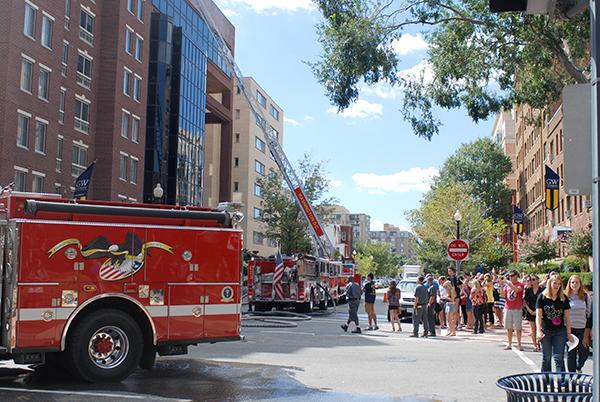The number of fires reported on campus decreased 60 percent last year to just seven incidents, according to the annual security report that the University released earlier this month.
GW counted seven fires on campus last year, compared to 18 in 2012. The Office of Health and Safety uses fire safety education and random room inspections for dangerous items like candles to reduce the overall number of fires on campus, University spokeswoman Maralee Csellar said.
“The decrease in fire related incidents is the result of students, faculty and staff working together and engaging in safe practices that reduce the possibility of fires,” Csellar said, adding that GW also offers fire extinguisher training classes and conducts evacuation drills.
Last year, two-thirds of all reported incidents came from grease and oven fires. In 2012, eight fires were started by either cooking with a stove or an oven.
Two years ago, two separate on-campus fires injured one student at each event. One came from a dryer catching fire in The Dakota that September, and another occurred after a dumpster caught on fire in the garage of City Hall, according to the annual report. Last year, no on-campus fires resulted in injuries.
In 2011, a fire broke out at the Zeta Beta Tau townhouse, causing hundreds of thousands of dollars in damage.
Robert Rowe, a certified fire inspector and deputy fire marshal from Los Angeles, said schools can prevent fires on campus by removing items such as hot plates and candles from student’s rooms, like the University does.
“Seven fires is better than 18 fires, but as a fire expert and as someone who sees the aftermath of fires, whether that be injury or death, one fire is too many,” Rowe said.
Brian Spiegel, a certified structural fire and smoke damage expert, said most residence hall fires start from too many household appliances overloading a circuit, as well as everyday cooking, lighting candles and burning incense.
Experts say sprinkler systems are the best way to prevent fires in residence halls because they soak the entire area to insure the fire does not spread.
Just 22 of the 32 residence halls on Foggy Bottom have full fire sprinkler systems, according to the report. Only half of the residence halls on the Mount Vernon Campus have full sprinkler systems.
“I am an advocate for fire sprinklers, either retrofit old buildings or include them with new construction, but all educational institutions and dormitories should have them,” Rowe said.
All residence halls at GW have fire extinguishers, according to the report. In 2011, the University was in violation of the International Fire Code after it failed to service expired fire extinguishers in Corcoran Hall.
Spiegel also said fire escapes are a necessary part of keeping safe students who live in urban residence halls. GW’s report does not list which residence halls on campus have fire escapes.
Marc H. Richman, a forensic expert who specializes in fire safety, said fires at universities are also often caused by students who smoke marijuana or cigarettes in their rooms.
“What you have to realize is that with how the dorms are set up today, it only takes one fire in a high-rise to be catastrophic,” Richman said.







